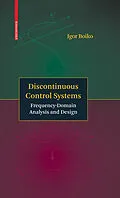Discontinuous control systems are one of the most important and oldest types of nonlinear systems; however, the available methods of analysis of their input-output properties are based on the approximate describing function method, which narrows the application of existing techniques to systems having good low-pass filtering properties. This book provides new insight on the problem of closed-loop performance and oscillations in discontinuous control systems, covering the class of systems that do not necessarily have low-pass filtering properties. The author provides a practical, yet rigorous and exact approach to analysis and design of discontinuous control systems via application of a novel frequency-domain tool: the locus of a perturbed relay system (LPRS).
LPRS theory is presented in detail beginning with basic concepts and progressing to computing formulas, algorithms, and MATLAB® code. As a result of LPRS properties such as exactness, simplicity, and convenience, many problems of analysis and design of discontinuous systems are solved easily by using the theory described. Presented are a number of practical examples applying the theory to analysis and design of discontinuous control systems from various branches of engineering, including electro-mechanical systems, process control, and electronics.
A few chapters of the book are devoted to frequency-domain theory of sliding mode control, which is presented as a special type of discontinuous control. LPRS analysis of the effects of chattering and nonideal closed-loop performance in sliding mode systems having parasitic dynamics, as well as the relationship of those effects with the ideal sliding mode, are given.
Discontinuous Control Systems is intended for readers who have knowledge of linear control theory and will be of interest to graduate students, researchers, and practicing engineers involved in systems analysis and design.
Zusammenfassung
Discontinuous control systems are the oldest type of control system and the mostwidespreadtypeofnonlinearcontrolsystem. Thetheoryofdiscontinuous control, and the theory of relay feedback systems in particular, is usually c- sidered a mature subject. However, many problems in discontinuous control theory still remain open. One problem involves the input-output properties of these systems, knowledge of which is extremely important to every app- cation. Two types of discontinuous control systems are studied in this book. The ?rst is the so-called relay feedback system, which normally encompasses - lay servomechanisms, various on-o? controllers, sigma-delta modulators, relay feedback tests used for process dynamics identi?cation, and controller tuning. Relaysystemsareoftenconsideredthemaintypeofnonlinearsystem,whichis evident by the enormous amount of house temperature control systems (that are usually implemented as on-o? controllers) that exist. The theory of relay systems is an old subject. The problem of analysis of relay feedback systems was ?rst considered by L. MacColl in 1945 [71]; the study was motivated by thedevelopmentofrelayservomechanismsofmissilethrustersontheonehand and vibrational voltage regulators on the other. MacColl's analysis was based on an approximate approach close to the describing function method. Later, exact methods of analysis of relay feedback systems were developed, the most well-known of which is the Tsypkin locus [94]. The exact approach developed by Tsypkin, however, did not consider the servo aspect of relay feedback c- trol. Its purpose was limited to ?nding periodic motions that may occur in a relay system in an autonomous mode or under external excitation.
Inhalt
The locus of a perturbed relay system theory.- The servo problem in discontinuous control systems.- The locus of a perturbed relay system (LPRS) theory.- Input-output analysis of relay servo systems.- Analysis of sliding modes in the frequency domain.- Performance analysis of second-order SM control algorithms.- Applications of the locus of a perturbed relay system.- Relay pneumatic servomechanism design.- Relay feedback test identification and autotuning.- Performance analysis of the sliding modebased analog differentiator and dynamical compensator.- Analysis of sliding mode observers.
